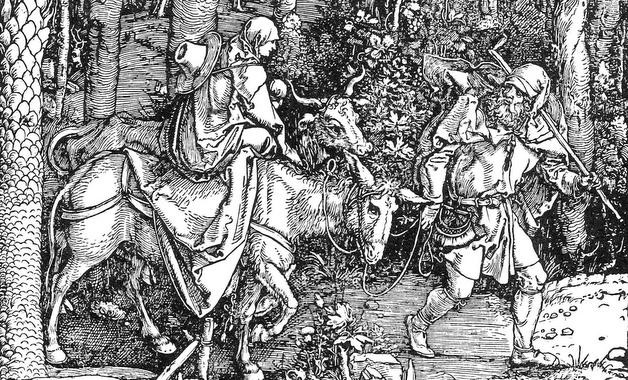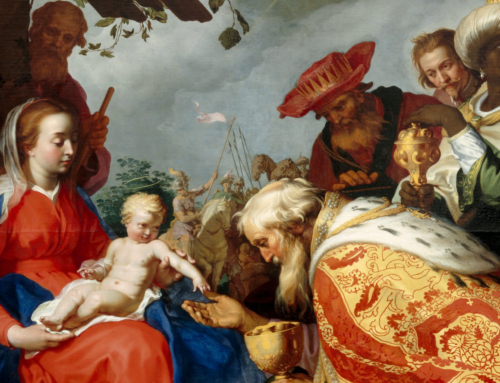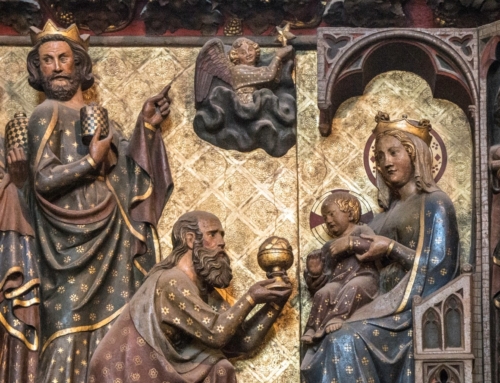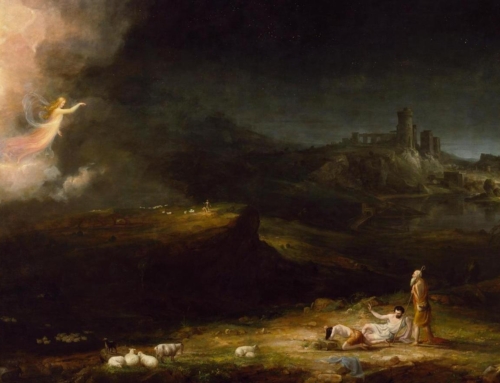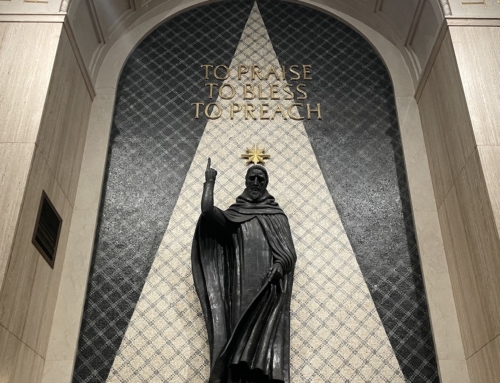I found myself one January day walking through the halls of Bambino Gesù children’s hospital on top of the Gianicolo in Rome. I knew the priest chaplain there, and he asked me to put on a fake beard and dress up as San Giuseppe and go around to cheer up the little children in the oncology ward.
We had a small Bambino Gesù for the children to kiss, and we prayed a little with the children and their parents. What was each child thinking? My words and their words didn’t align, not just because of our different languages. I couldn’t cure their cancer or give them advice. What about the parents? Did they, like Job’s wife, want to “curse God and die” (Job 2:9)?
Did the child here in this room, bald and weak, know what the doll he was kissing represented? Did it comfort the suffering child to see a crucifix in her room? I can’t know. When they saw me in my silent San Giuseppe costume, did it bring them any joy at all?
“I, too, perhaps, may cry aloud with the rest, looking at the mother embracing the child’s torturer, ‘Thou art just, O Lord!’ but I don’t want to cry aloud then. While there is still time, I hasten to protect myself, and so I renounce the higher harmony altogether… Imagine that you are creating a fabric of human destiny with the object of making men happy in the end, giving them peace and rest at last, but that it was essential and inevitable to torture to death only one tiny creature — that baby beating its breast with its fist, for instance — and to found that edifice on its unavenged tears, would you consent to be the architect on those conditions? Tell me, and tell the truth.”
These words of Ivan Karamazov didn’t run through my head when I saw the suffering children. I merely prayed for them in my silence. How could I answer that question; what could I say? Ivan wants not just to reject God in an intellectual way, but to reject the whole “higher harmony” and his own part in it. I don’t reject God at all. For Karamazov, all of reality was unbearable. For me, I am content to look down at the ground and say my prayers and sleep in my bed at night.
The tired mother tried to cajole her peaceful child to kiss the infant, to say her prayers. But her eyes betray her: this sickness is exhausting. I can’t see her soul, though. After giving birth, Mary went into exile. This other, maculate mother is in a different exile. Not Egypt, but the desert of caring for a dying child. It is tempting to see all this as sheer meaninglessness. If I can’t have my child that I brought into the world, what can I have, who can I protect? That’s what I might say if I were a mother. I am not even a father of this child. Just a faux San Giuseppe, a silent imitator of the silent foster father of a child with his suffering mother.
If I knew Italian I might have said something easy, such as, “Oh, my little one. Jesus loves you very much. He can save you. He will bring good out of this situation. Don’t worry.” And then to the mother, “Don’t worry, you can see her when you are both in heaven. We can’t ask too many questions, you know.” Thank you, God, for not allowing me to know Italian on this day. The silence of San Giuseppe speaks more than words can at this time, in this place.
Like Herod’s soldiers killing the Innocents, cancer is killing these children. “All have sinned,” says St. Paul; “in thy sight, [God], no one is clean of sin, not even the infant whose life is but one day upon earth,” says St. Augustine. Adam’s curse condemns us to death, but also plays havoc with the mind. Despairing against God’s mercy is too easy, but faith itself is hard. Those two-year-olds in Palestine bore sin? These bambini in Rome aren’t really innocent? What words can satisfy Ivan’s objection? What is the line separating faith and blindness?
Standing there, the words were caught in my throat. I could not say to the mother, “The Lord giveth and the Lord taketh away: Blessed be the name of the Lord!” (Job 1:21). The cradle and cross, here in Rome. Sorrowful mothers, dumbstruck fathers, crucified children: the darkness is blinding in the moment. But there must be hope, the hope given by a God who suffers with us. If he does not, then Ivan is right: we should exit stage left.
But the child kisses the babe. The tired, faithful mother ekes out a smile through the tears in her eyes. Silently San Giuseppe stays and suffers the mystery. Slowly, the fugitive family returns once the storm of Herod’s wrath is over. Slowly, the family in the hospital may find meaning during this suffering through their faith, not in words, but in the Word. Now, O Virgin Mother, ask your Son to act! O infant Jesus, you who will rise from the dead, save the innocents whom you will redeem by your own blood!
✠
Image: Albrecht Durer, The Flight into Egypt

